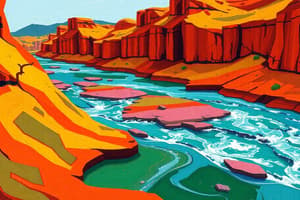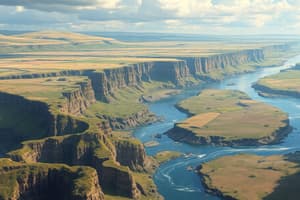Podcast
Questions and Answers
Which of the following is NOT a type of material transportation in a river?
Which of the following is NOT a type of material transportation in a river?
- Suspension
- Saltation
- Sublimation (correct)
- Traction
The faster a river flows, the less likely it is to erode the riverbed.
The faster a river flows, the less likely it is to erode the riverbed.
False (B)
What are the four main types of erosion caused by a river?
What are the four main types of erosion caused by a river?
Attrition, corrasion, hydraulic action, and corrosion.
The process of ______ refers to the laying down of eroded material by a river.
The process of ______ refers to the laying down of eroded material by a river.
Match the river erosion process to its description:
Match the river erosion process to its description:
Flashcards
Traction
Traction
Movement of large rocks and boulders rolled along the riverbed.
Saltation
Saltation
Smaller stones are bounced along the riverbed.
Erosion
Erosion
Wearing away of land faster due to moving water.
Attrition
Attrition
Signup and view all the flashcards
Waterfall formation
Waterfall formation
Signup and view all the flashcards
Study Notes
River Processes
- Rivers erode material through four main processes:
- Traction: Large rocks and boulders are rolled along the riverbed.
- Saltation: Smaller stones are bounced along the riverbed.
- Suspension: Fine material is carried in the flow of water.
- Solution: Minerals dissolve in the water.
River Landforms
- V-shaped valleys form in Highland areas with interlocking spurs.
- A river in flood transports eroded material along its bed, cutting downwards and deepening the riverbed.
- After heavy rainfall, soil moves downhill under gravity, making the valley steep-sided and V-shaped.
- Erosion deepens the valley faster than it widens.
Waterfalls
- Waterfalls develop as follows:
- Soft rock is worn away.
- Hard rock is undercut and unsupported.
- Hard rock collapses.
- The waterfall retreats upstream.
- A steep-sided gorge is left behind.
River Erosional Processes
-
Attrition is when material is moved along the riverbed and collides with other pieces, breaking them into smaller pieces.
-
Corrasion is caused by fine material rubbing against the riverbank, like sandpaper.
- Hydraulic action is the force of water hitting the banks, wearing them away and causing them to collapse.
-
Corrosion is the form of chemical erosion, where materials in the riverbed are dissolved by acids.
-
Erosion is the wearing away of land when water flows fastest and carries large amounts of material.
Deposition
- Deposition is the laying down or dumping of eroded material.
- It happens when a river loses energy.
- It may occur during a dry spell, or on the inside of a river bend.
Studying That Suits You
Use AI to generate personalized quizzes and flashcards to suit your learning preferences.



